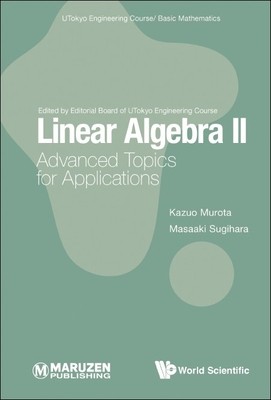
- We will send in 10–14 business days.
- Author: Kazuo Murota
- Publisher: Co-Published with World Scientific
- ISBN-10: 9811257051
- ISBN-13: 9789811257056
- Format: 15.2 x 22.9 x 1.8 cm, kieti viršeliai
- Language: English
- SAVE -10% with code: EXTRA
Reviews
Description
This is the second volume of the two-volume book on linear algebra in the University of Tokyo (UTokyo) Engineering Course.The objective of this second volume is to branch out from the standard mathematical results presented in the first volume to illustrate useful specific topics pertaining to engineering applications. While linear algebra is primarily concerned with systems of equations and eigenvalue problems for matrices and vectors with real or complex entries, this volumes covers other topics such as matrices and graphs, nonnegative matrices, systems of linear inequalities, integer matrices, polynomial matrices, generalized inverses, and group representation theory.The chapters are, for the most part, independent of each other, and can be read in any order according to the reader's interest. The main objective of this book is to present the mathematical aspects of linear algebraic methods for engineering that will potentially be effective in various application areas.
EXTRA 10 % discount with code: EXTRA
The promotion ends in 23d.20:59:25
The discount code is valid when purchasing from 10 €. Discounts do not stack.
- Author: Kazuo Murota
- Publisher: Co-Published with World Scientific
- ISBN-10: 9811257051
- ISBN-13: 9789811257056
- Format: 15.2 x 22.9 x 1.8 cm, kieti viršeliai
- Language: English English
This is the second volume of the two-volume book on linear algebra in the University of Tokyo (UTokyo) Engineering Course.The objective of this second volume is to branch out from the standard mathematical results presented in the first volume to illustrate useful specific topics pertaining to engineering applications. While linear algebra is primarily concerned with systems of equations and eigenvalue problems for matrices and vectors with real or complex entries, this volumes covers other topics such as matrices and graphs, nonnegative matrices, systems of linear inequalities, integer matrices, polynomial matrices, generalized inverses, and group representation theory.The chapters are, for the most part, independent of each other, and can be read in any order according to the reader's interest. The main objective of this book is to present the mathematical aspects of linear algebraic methods for engineering that will potentially be effective in various application areas.


Reviews